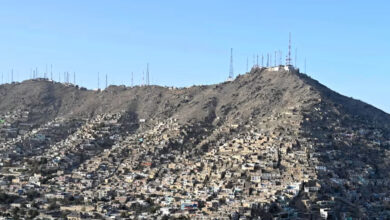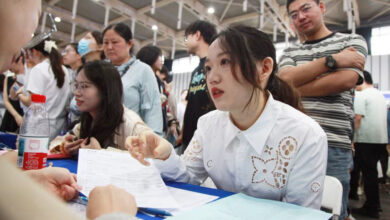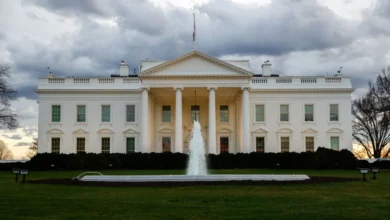
Perhaps 2013 was not the best year to be guest of honor at the Cairo International Book Fair. Although the fair's 44th edition was extended by four days, from 5 February to 9 February, so that publishers could try to make up sales that had been badly effected by ongoing street clashes since the second anniversary of the 25 January revolution, on the seventh the special guests — Libyan publishers — were already mostly packed up and gone.
Having located the Libyan tent at an isolated spot in the furthest corner from the fair’s entrance, we arrived to find the large structure was starting to be dismantled and stepped over carpets that were in the process of being ripped up.
But inside, although almost all of the 40 booths had been abandoned, two were still manned. Omran Salem of the Libyan Ministry of Culture and Civil Society was packing up books in the ministry’s double-sized booth, while Yassir Hamouda of the Libyan/Egyptian publisher Dar al-Houssam was tenacious, standing ready to talk to visitors, his book displays still untouched.
“Everyone packed up early because there were not enough buyers,” said Salem, who has been to the fair before as the ministry has a regular presence there. “Interest is not like it used to be, and I think it is because of the violence.”
Both initially said they did not want to talk to journalists but changed their minds without much persuasion and turned out to be rather chatty.
“The kind of readers we usually attract are students, graduate and postgraduate students who come to buy books about specific topics that they are studying,” said Salem, who mainly sells literature, history and poetry books.
Asked about what selection of books the ministry brought to the fair, whether it had changed since the 2011 uprisings, he said, “I will talk about books but I will not talk about politics!” before conceding that they are bringing the same kind of books to the fair as they did before. “In general, recently there has been more interest in books on Libyan history and the recent events in Libya,” he added.
Hamouda agreed that interest has suffered due to the current events. “Before the revolution the Cairo book fair was more of a leisure experience for Egyptian families, and the scene of families in parks, eating and having fun was more present, but now the fair is mainly just attracting readers – because of the events families probably feel safer staying at home.”
Dar al-Hossam focuses mainly on children’s books, often with a religious approach, and has a store in Cairo’s Al-Azhar district. Hamouda said that readers in Libya and those in Egypt are remarkably similar. “We publish books by other Arab authors as well and that goes to show that nationality does not have an impact on reading.”
Unlike Salem, Hamouda was not wary of talking about politics. “There is much more freedom for publishing in Libya at the moment. There are lots of people who were banned before the revolution, who were not allowed to speak to the media or travel or write, who are now allowed to.”
Asked about the spread of Islamic books in the Cairo book fair, Hamouda said “Before the revolution because Islamism was banned people were very curious and sympathetic,” he said, using a proverb, “al-mamnua marghoub” – what is forbidden is desired – to characterize Arab culture.
“Things will become more balanced now,” he predicted. “Islamist books will decline in popularity as long as there is freedom of speech and equal chances for different types of voices.”
Asked whether he thought censorship would endure in post-uprising countries, Hamouda suggested that it would. “I support freedom but freedom should not be absolute, if it means people can hurt other people,” he said. “But the regime should not be the authority that bans things, there should be an independent judiciary that people can rely on if they want things to be censored — it should be the job of law, not the regime.”




